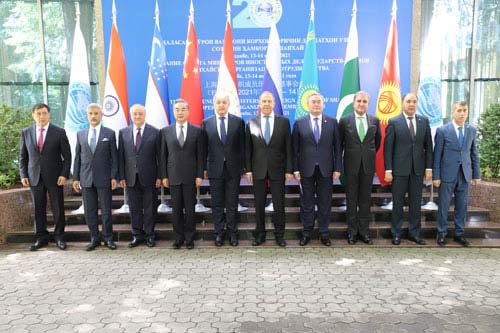
20 years of security and development cooperation in SCO
Muhammad Asif Noor
Shanghai Cooperation Organisation (SCO) is celebrating its 20 years this year. Since its establishment, this important multilateral forum has made significant contributions to the common security and development pursuit of the region. At the time of inception, SCO was meant to address “the three evils”, i.e., extremism, separatism, and terrorism in the region. Since then, it has been prioritising cooperation, trade, economic collaborations, and people to people ties. As a result, SCO has come of age with expanded membership including Pakistan and India. It is significant to note that SCO is operating especially when Afghanistan is in shambles with the chaos created by the US and its allies. Apart from the mounting security threats and rise of terrorism in the region in a post-US-withdrawal scenario, growing poverty, and economic disparities also threaten regional security and stability. SCO has the unique position to contribute to regional peace and stability through regional structures, policies, and programs. Regional Anti-Terrorist Structure (RATS) primarily focuses on coordination and communication to eradicate the “three evils”. The recent announcement of the SCO Development Strategy until 2025 further reflects its evolution for regional progress and security.
Established in 2001, SCO now consists of eight permanent member states including China, Russia, Kazakhstan, Uzbekistan, Kyrgyzstan, Tajikistan, and new members Pakistan and India which joined in 2017. SCO covers a quarter of the world’s population. Two of its member states – Russia and China – are permanent members of the UN Security Council. Four nuclear weapon states with 42 percent of the world’s population are residing in the region with combined GDP accounting for 27 percent of the world total. This reflects the significance of this region and the importance of SCO in the global political system. SCO has progressed fairly quickly from its inception to a relatively prominent regional player. In December 2004 it gained official observer’s status at the UN General Assembly. The SCO Charter, adopted in 2002, defines the main purpose of the organisation, which is to strengthen mutual trust and cooperation in diverse sectors to maintain peace, stability, and security in the region. With regular high-level meetings and other regional meetings on thematic issues, SCO formulates proposals based on consensus and implements them through a coordinating Secretariat based in Beijing.
It is necessary to understand the significance of China in the SCO mechanism. Given the ideals of China’s foreign policies especially the five principles of peaceful coexistence and emphasis on multilateralism, SCO is an important pillar supporting China’s foreign policies. The security collaboration between China and other SCO members has significantly deterred global hegemony. We have witnessed equal and steady partnership guided by the Shanghai Spirit featuring mutual trust and co-existence. The head office of Regional Anti-Terrorism Structures (RATS) is in Tashkent with regular meetings on regional security issues, including drug and human trafficking, terrorist financing, terrorist organisation and their monitoring, intelligence sharing, and other related matters. Over the years, the mechanism of joint military exercises has also been started to develop consensus, impart operational level knowledge, and share information. This is a unique initiative that is helping the countries to build close cooperation in regional security operations.
SCO’s recently announced development framework is another path towards regional integration and cooperation. As SCO has set a qualitative approach towards human security including how to address the emerging nontraditional security threats, cooperation in all human development areas has been enhanced in SCO. This strategy was announced in 2014 based on SCO Charter’s basic idea of good-neighborliness, friendship, and cooperation. It defines the areas of cooperation in politics, economy, culture, human and humanitarian issues, media, openness, and transparency. Pakistan has experience of fighting extremism and terrorism, such experience will be useful in SCO. China on the other hand has experience of eradicating poverty and developing multilateral development projects like BRI, AIIB, and others. This is an added value to SCO. SCO has yet to make an emergency response mechanism for some emerging threats, but the existing structures can be well-adjusted to resolve severe challenges against regional peace and security.
The writer is Director of Institute of Peace and Diplomatic Studies, Pakistan.
